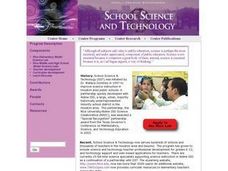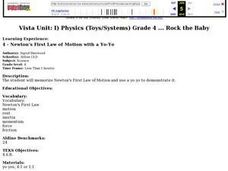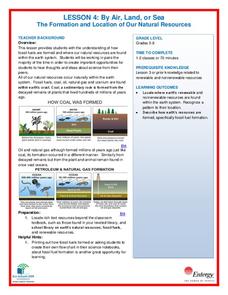Curated OER
How would an oil spill affect a Marine Sanctuary?
Students explore the concept of environmental stewardship. In this science lesson, students discover how scientists assess damages to the environment following oil spills. Students conduct a simulation of a public meeting in order to...
Curated OER
States of Matter
Learners discover states of matter. In this science lesson plan, students define matter, identify states of matter, explain properties of matter, and demonstrate the various uses of the states of matter.
Curated OER
Newton's First Law of Motion with a Glider
Third graders examine, analyze, study and memorize Newton's First Law of Motion utilizing a glider to demonstrate the process. They state, sing, draw or enact an example/illustration of Newton's First Law of Motion in front of their...
Curated OER
Newton's First Law of Motion with a Yo-Yo
Fourth graders are introduced to, summarize, analyze and memorize Newton's First Law of Motion and experiment demonstrating the theory with a yo-yo. They state, sing, draw, or enact Newton's First Law of Motion several times and with...
Curated OER
A Pill with a View
Students brainstorm a list of potential uses for micro-video technologies. After reading an article, they analyze the development of a new pill-sized camera. In groups, they create a children's book that shows them the various systems of...
Baylor College
Activity and Exercise
Leave it to the classic jump rope to get your class excited about physical activity! Your class will begin by discussing the benefits of jumping rope as a form of exercise and learning a few different types of jumps. Then in groups of...
Science Matters
Energy Flow
Budding scientists work collaboratively to reenact energy flow in a food chain. Scholars take on roles such as producer and consumer and perform tasks that symbolize energy flow in order to provide evidence of how much energy passes...
Curated OER
A Seashell Lesson: Writing for Detail and the Scientific Process
Practice descriptive language in this lesson, which prompts elementary and middle schoolers to write detailed descriptive sentences describing a seashell. They write a description of a shell, create an illustration, and other students...
Center for Learning in Action
Introduction to the States of Matter
Liquids, gases, and solids are the states of matter in which scholars investigate in a lesson plan that offers in-depth information and engaging activities that look into the three states and the changes their properties make when mixed...
Center for Learning in Action
Density
Explore the concept of density within states of matter—gases, liquids, and solids—through a group experiment in which young scientists test objects' texture, color, weight, size, and ability to sink or float.
Center for Learning in Action
Gases
Explore the properties of gases through one activity and two investigations in which super scientists observe the changes gas makes when encountering different conditions.
Center for Learning in Action
Challenge with Solids, Liquids, and Gases
There's a container for every matter—liquid, solid, and gas. Pupils design three different containers, each with the capability to hold one of the states of matter, and share their design with the class.
Center for Learning in Action
Water—Changing States (Part 1)
Here is part one of a two-part lesson in which scholars investigate the changing states of water—liquid, solid, and gas. With grand conversation and up to three demonstrations, learners make predictions about what they think will happen...
Center for Learning in Action
Introducing Physical and Chemical Changes
Young scientists investigate chemical and physical changes to the states of matter—gas, liquid, and solid—as well as solutions and suspensions with a variety of demonstrations, grand conversation, and an interactive quiz to check for...
Center for Learning in Action
Water – Changing States (Part 2)
Here is part two of a two-part lesson in which scholars investigate the changing states of water—liquid, solid, and gas—and how energy from heat changes its molecules. With grand conversation, two demonstrations, and one hands-on...
National Wildlife Federation
By Air, Land, or Sea: The Formation and Location of Our Natural Resources
Coal forms from the ancient remains of plants that were alive on Earth before the dinosaurs! Scholars use their t-charts from the previous lesson over resources and research to determine if their information is correct. Through analysis...
Science Matters
Plot Study
Small groups investigate plots of land to discover how abiotic and biotic factors interact. After recording their findings, scholars share observations with peers and self-reflect on the learning process.
Science Matters
Crawly Composters
Get your hands dirty with an interactive lesson plan that showcases the process of decomposing and returning nutrients back into the soil. After building a compost pile, pupils regularly observe the ways worms help with changes to the...
Science Matters
That’s An Otter Story
Young scientists discover how sea otters' habitats have changed due to human impact. Through conversation, video observation, and story reading, scholars identify how human interactions change a specific ecosystem in both positive and...
Curated OER
Solid Waste and Recycling
Students demonstrate effects of waste on environment and ways of reducing it, observe how much packaging goes into bag lunches each day, and survey their families to assess awareness levels and household recycling practices. Lessons all...
Curated OER
Mystery of Mirrors: Discovery Stations
Hands-on stations in which groups of primary learners experience what mirrors can do provide opportunities for experimenting and authentic discovery. Recording their observations in complete sentences seems age-inappropriate. Drawing...
National Wildlife Federation
It's a Green Revolution: An Introduction to Eco-Schools USA
Eco-schools is a project of the National Wildlife Federation and empowers schools to manage their schools with a green focus. Scholars work to define environment and sustainability and springboard this into learning the eight pathways...
Curated OER
Hatching Chickens
Young scholars observe chickens hatching in a classroom incubation environment In this egg-hatching lesson plan, students make observations of the hatching process and later care for the hatched chickens.
Curated OER
Urban Life: What Lives in Our Schoolyard?
Students research living organisms by exploring their school grounds. In this microscopic observation activity, students gather materials, insects, and objects from their playground and schoolyard and bring them into class. Students...

























